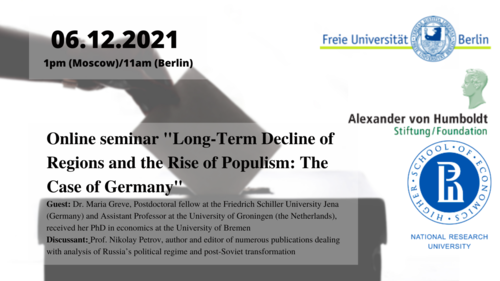Online HSE-FUB seminar "Long-Term Decline of Regions and the Rise of Populism: The Case of Germany"
The institutional partnership project between the Institute for East European Studies of the Free University Berlin (FUB) and the National Research University Higher School of Economics (HSE University) supported by the Alexander von Humboldt Foundation (AvH) is inviting you to attend the series of online seminars "Varieties of populism in East and West".
News from Nov 24, 2021
The theme of the third workshop will be "Long-Term Decline of Regions and the Rise of Populism: The Case of Germany".
The guest speaker - Dr. Maria Greve - Dr. Maria Greve is a Postdoctoral fellow at the Friedrich Schiller University Jena (Germany) in the project entitled “The legacy of the GDR innovation system“ and Assistant Professor at the University of Groningen (the Netherlands). She received her PhD in economics at the University of Bremen. Her research interests include transformation processes in former socialist countries; historical roots of socio-economic processes; institutional determinants of entrepreneurship; small business dynamics; innovation, productivity and growth; regional development; and policy assessment.
Main theses of the speaker and research co-authors:
What characterizes regions where right-wing populist parties are relatively successful? A prominent hypothesis proposed in recent literature claims that places that are “left behind” or “do not matter” are a breeding ground for the rise of populism. We re-examine this hypothesis by analyzing the rise of populism in Germany. Our results suggest that the high vote shares of populist parties are not only associated with low regional levels of welfare as such, but also with the long-term decline of a region’s relative welfare. Hence, it is not the regions that do “not matter” that are most prone to the rise of populism, but the regions that once mattered, but are in long-term decline. Moreover, we find that regional knowledge represents an important channel through which the historical decline in wealth explains voting behavior in German regions.
Discussant – Prof. Nikolay Petrov, author or editor of numerous publications dealing with the analysis of Russia’s political regime, post-Soviet transformation, socioeconomic and political development of Russia’s regions, democratization, federalism, and elections, among other topics.
Language: English
Date: 6th of December, 2021
Time: 11:00 AM Berlin Time Zone
Online Platform: Zoom
We count with ca. 1.3 hours workshop duration.
More information about the seminar series of FUB-HSE "Varieties of populism in East and West" on the HSE website or on Facebook.
